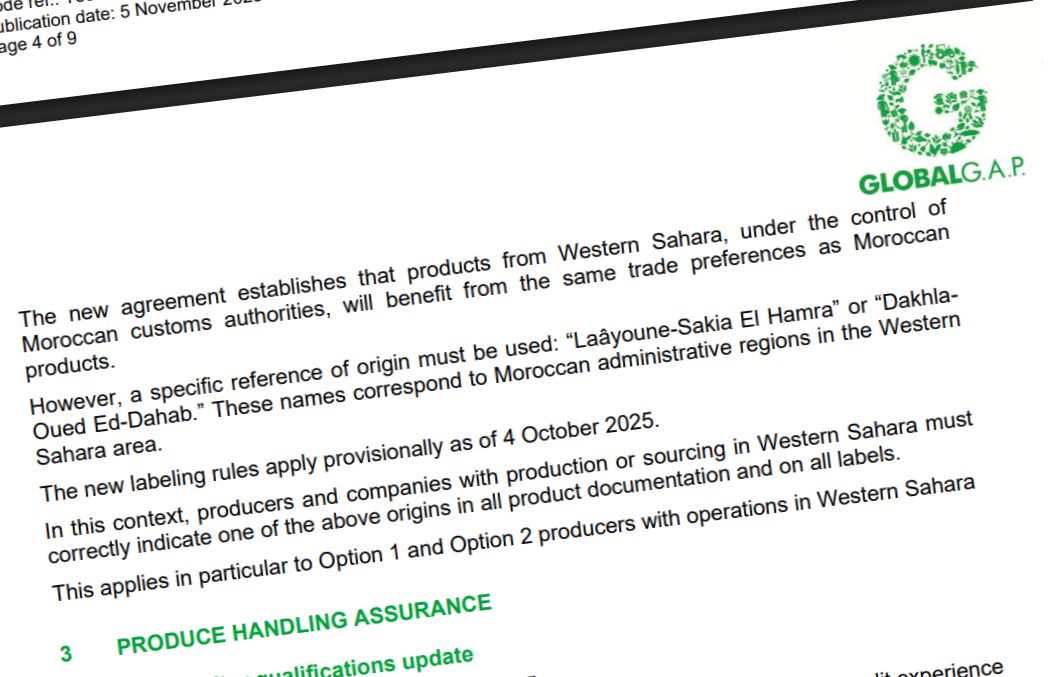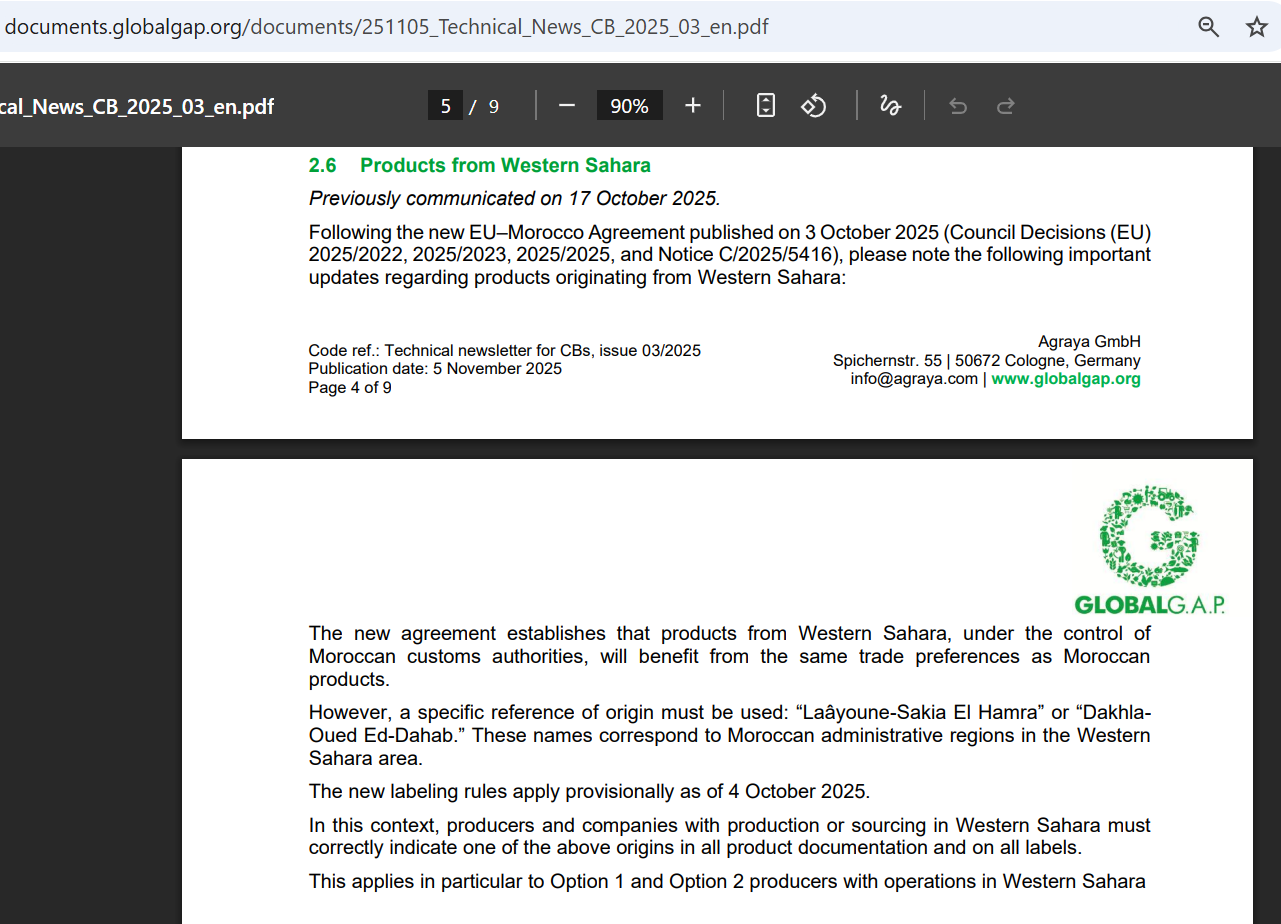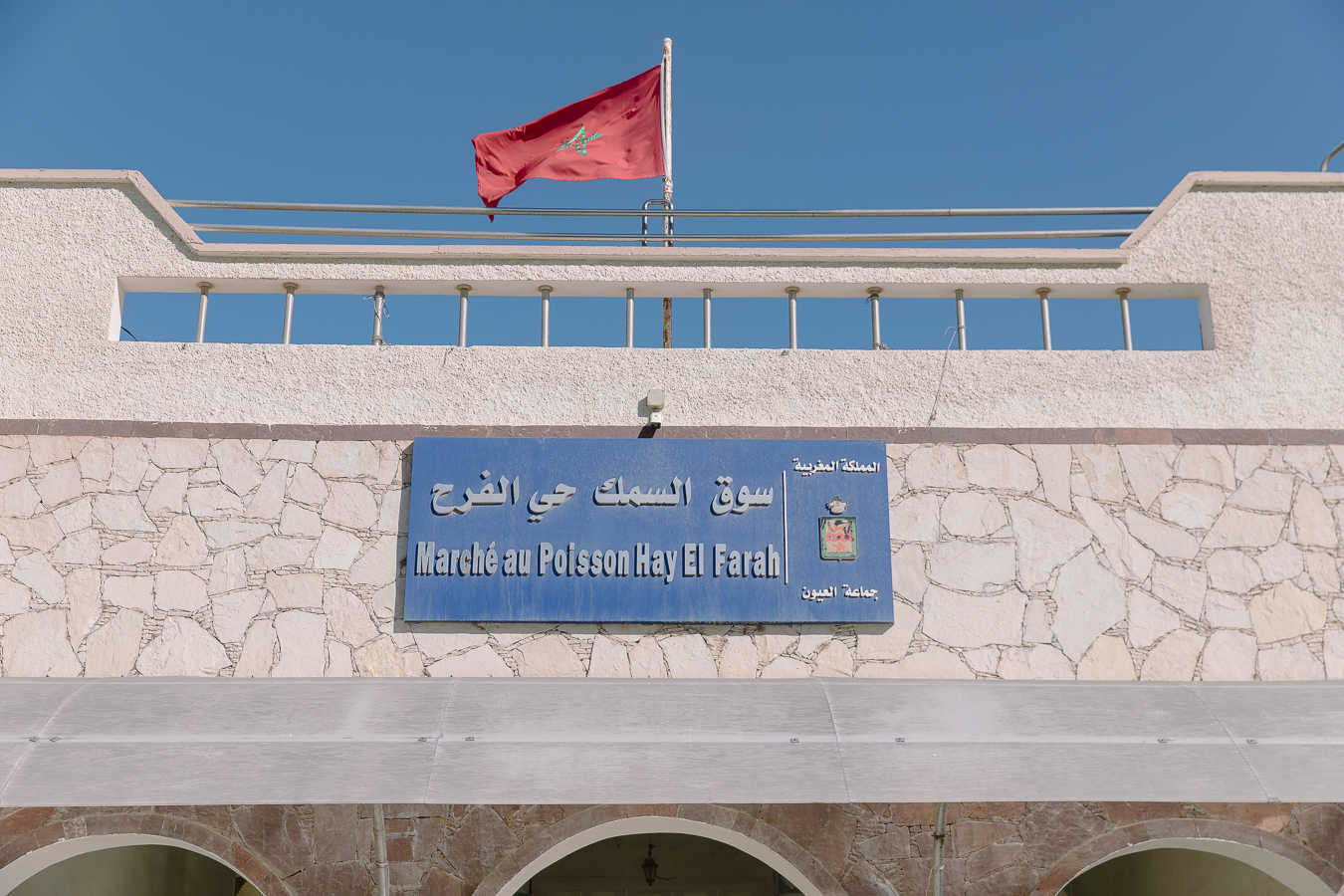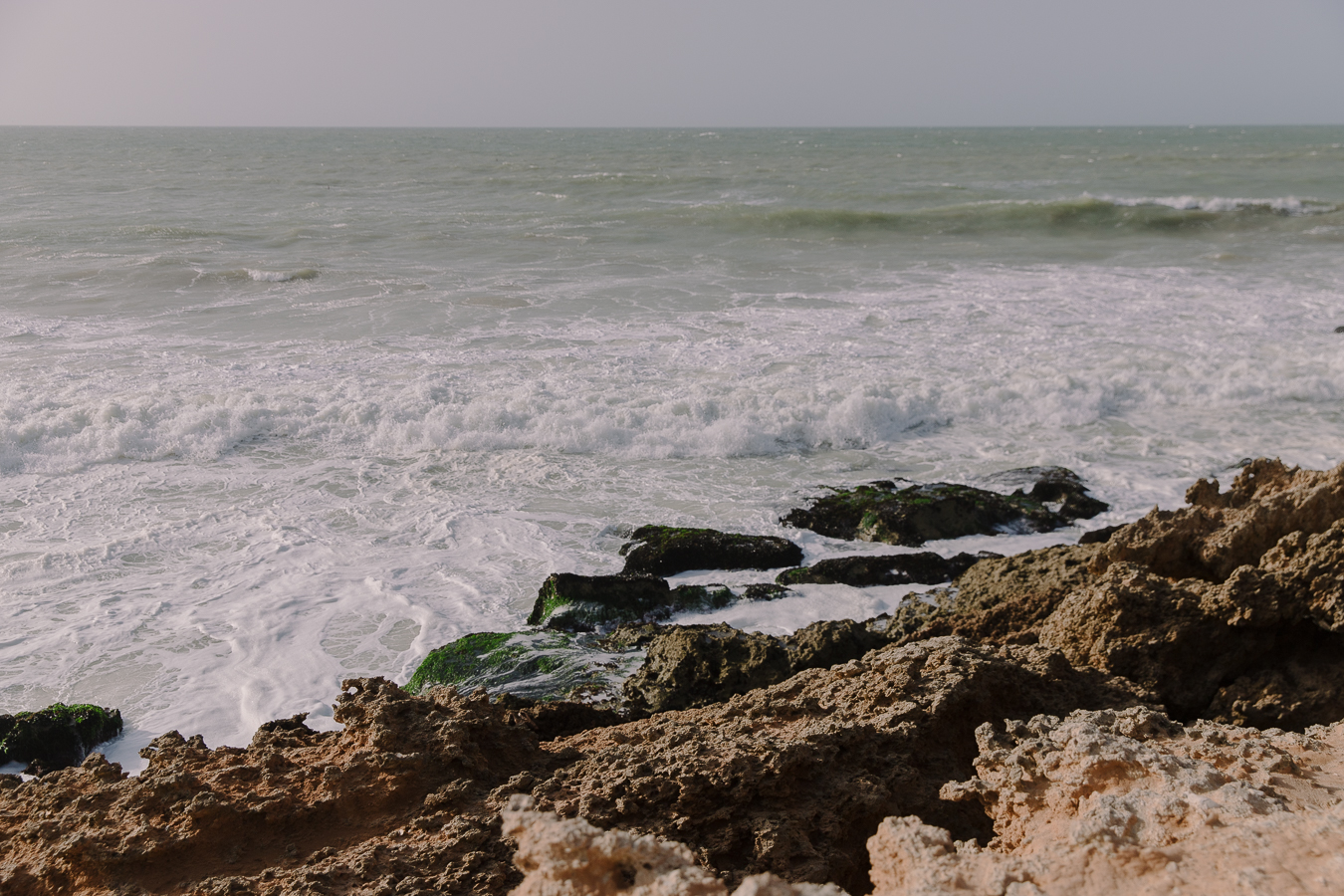
The certification scheme that claims to champion legal compliance has circulated misleading information about EU labelling rules for products originating from occupied Western Sahara.
On 17 October 2025, GLOBALG.A.P. informed its network that “the new labelling rules apply provisionally as of 4 October 2025”, and that producers sourcing in Western Sahara “must correctly indicate" one of Morocco's administrative regions as origin "in all product documentation and on all labels”.
The German certification scheme has – controversially – allowed Moroccan agricultural producers operating on occupied land to obtain certificates claiming they act “responsibly”. Not only are the legal-compliance checks in Western Sahara conducted according to the laws of the neighbouring state of Morocco; GLOBALG.A.P. is now also providing misleading information about EU regulations.
GLOBALG.A.P.’s new message implies that products from Western Sahara must already carry the names of Morocco’s imposed administrative regions - despite the fact that these labelling rules have not yet entered into force.
The French distributor Sofruce/Anima had already adopted this Moroccan terminology on its GLOBALG.A.P.-certified products. This was revealed by WSRW earlier this week. The tomatoes are grown on a Moroccan-run farm in the occupied territory, certified by GLOBALG.A.P. as farming “responsibly”, while the French importer holds a GLOBALG.A.P. Chain of Custody certificate.
Yet the Commission’s proposed labelling system, which ignores the 4 October 2024 CJEU ruling prohibiting the labelling of Western Sahara as Moroccan - has not yet taken effect. Rather than clarifying the legal situation, GLOBALG.A.P has deepened the confusion. The organisation has earlier avoided explaining why it considers Moroccan legal checks relevant in a territory that is not part of Morocco under international law.
What entered into provisional application on 4 October 2025 is the EU-Morocco trade agreement itself, pending consent the EU Parliament and final conclusion by Council.
The labelling rules, however, require a change to the Delegated Regulation on marketing standards for fruit and vegetables. Yet the amended Delegated Regulation has not been adopted, has not entered into force, and therefore cannot apply provisionally.

On 16 October 2025, the Commission published a “Notice to operators” regarding labelling of products from the territory. The new labelling rules will apply only once the Delegated Regulation is formally adopted, after which they will apply retroactively. Until then, existing EU marketing standards remain fully in force - meaning that origin must continue to be labelled “Western Sahara”.
The Commission’s message did allow stock already labelled “Western Sahara” to remain on shelves, yet it failed to clearly prohibit the premature use of Moroccan regional names. This ambiguity has already resulted in mislabelling in France, illustrating the practical fallout of the Commission’s decision to push a politically sensitive change before the legal framework is in place. The consequence is legal uncertainty for consumers, traders, and authorities, with operators violating EU law without realising it.
Consumers should be aware of the following when observing GLOBALG.A.P.-certified products from Western Sahara.
- Certified farms are not assessed against the correct legal regime at the location of production, as one has made use of legislation of the neighbouring country of Morocco.
- The GLOBALG.A.P. database lists producers in the wrong country, with geographical errors on the certificates themselves. The database states that farms in Western Sahara are located in Morocco. This is incorrect.
- GLOBALG.A.P.-certified products in Europe, traded by Chain of Custody-certified retailers, are currently labelled with the wrong country of origin information, as the retailers have been misguided by GLOBALG.A.P.
“This entire mess would be solved from one day to the other if GLOBALG.A.P simply starts supporting principles of international law and stops facilitating Morocco’s profoundly irresponsible farming in occupied Western Sahara”, stated Erik Hagen in Western Sahara Resource Watch.
It remains unclear how much GLOBALG.A.P. financially benefits from granting certificates to Moroccan operators active in the occupied territory that export without respecting the Saharawi people’s rights.
GLOBALG.A.P. issued its erroneous advice less than two weeks after the EU Council’s early October decision to sign the amended EU-Morocco trade deal, intended to preserve trade flows from the occupied territory. Yet it took the organisation six months to inform its members about the CJEU ruling from one year before.
While its earlier April 2025 communication provided a reasonably accurate summary of the CJEU’s reasoning, it failed to include the crucial point that Western Sahara is not part of Morocco.
Its most recent statement in October, GLOBALG.A.P even refers to the territory as “the Western Sahara area” - a formulation inconsistent with UN terminology, the rulings of CJEU and international judicial languages.
WSRW has repeatedly pointed out the paradox: GLOBALG.A.P. acknowledges the CJEU’s legal conclusions in theory, yet disregards them in practice by allowing Moroccan nomenclature and Moroccan legal checks for entities in a territory the Court recognises as “separate and distinct.”
GLOBALG.A.P., headquartered in the Germany area, told WSRW that “There is no ‘paradox’ in the GLOBALG.A.P.’s practice” and that it “promotes good agricultural practice and responsible farming, including compliance with applicable laws for the production process.” It still has not explained why it believes Moroccan law applies in the non-self-governing territory Western Sahara.
Since you're here....
WSRW’s work is being read and used more than ever. We work totally independently and to a large extent voluntarily. Our work takes time, dedication and diligence. But we do it because we believe it matters – and we hope you do too. We look for more monthly donors to support our work. If you'd like to contribute to our work – 3€, 5€, 8€ monthly… what you can spare – the future of WSRW would be much more secure. You can set up a monthly donation to WSRW quickly here.
New report: Certified occupation
International certification standards embellish Morocco’s controversial trade with fisheries and agricultural products in occupied Western Sahara, new report documents.
Certification giant SGS points fingers elsewhere
SGS blames everyone else for mistakes on MarinTrust certificates it had issued to Moroccan companies in occupied Western Sahara.
GMP+ does not check if “sustainable” fish is legally caught
The world’s largest certification scheme for “safe and sustainable animal feed” does not check whether its certified fish feed companies source from illegal fisheries in occupied Western Sahara, where catches violate the Saharawi people’s right to self-determination.
ASC withdraws from occupied Western Sahara
Certification scheme ends involvement with Azura Group and declares that no future certifications will be granted to companies in the occupied territory.



